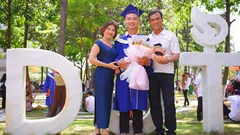
Everyone loves a tale of overcoming obstacles—however, few stories are as powerful or inspiring as the one of Japonz Dacumos, a Filipino who graduated summa cum laude as a person with autism. His story challenges common perceptions about what people with autism can accomplish in our society. If you're curious about how someone with unique challenges rose up the ranks of academia and beyond, this is a fascinating story that's both heartwarming and profoundly motivating.
The Early Years: An Unexpected Diagnosis
Japonz was still a young child when his family learned of his autism diagnosis. In the Philippines, this news can be stressful, as access to therapy and special education isn't always easy. But Japonz's family responded differently. Not only did they seek out appropriate interventions and support, they also believed in his potential to learn, develop, and thrive in mainstream schools. According to the Philippine Statistics Authority, about one out of every 100 kids nationwide is diagnosed with autism, making Japonz's story a symbol of hope for families across the country.
Overcoming Barriers: School and Society
Navigating school can be difficult—more so if you need additional help. Many Filipino students with special needs face discrimination, a lack of adaptive learning programs, or little understanding from peers and teachers. Japonz's story was different: the schools he attended welcomed him, modifying lessons and incorporating his unique learning style. His family's guidance, coupled with patience and determination, enabled him to achieve academic excellence. In college, he was often among the top students in his class—a rare feat for someone who started out facing sensory and social challenges.
Facts That Break Stereotypes
- Summa Cum Laude is the highest academic honor in Philippine universities, usually awarded to less than 1% of a graduating class.
- Japonz finished with a bachelor's degree in Psychology, a field where understanding human behavior is crucial.
- His experience is helping change public perceptions about autism and neurodiversity nationwide.
"I want to show that being on the spectrum doesn't mean you can't achieve your potential. With dedication and support, anything is possible."
Building a Support System: Family and Community
Achievement doesn't happen in a vacuum. Japonz credits his family's perseverance and faith, his teachers' open-mindedness, and his classmates' acceptance as the foundations for his success. Schools across the Philippines are now starting to implement inclusive education programs inspired by stories like his. Community groups like the Autism Society Philippines (ASP) also play a vital role by providing workshops, peer support, and spreading awareness about how people with autism can thrive when given the opportunity.
Redefining Limits: Inspiration for the Filipino Youth
Japonz Dacumos's achievement is more than just a personal milestone. It's an invitation for all of us to look beyond labels. Every year, thousands of Filipino families seek ways to support children with special needs, but opportunities are often limited by outdated notions or a lack of resources. Success stories like this remind us to nurture the potential of our children and celebrate neurodiversity. They inspire the next generation to dream big, break down barriers, and fight for more inclusive schools and workplaces.
Children with autism in the Philippines, and all over the world, deserve to be recognized, valued, and given the right opportunities. With more than 600,000 Filipinos on the spectrum, every achievement is a sign of a more accepting society—one that's open to all kinds of talent.
As I reflect on this remarkable journey, I can't help but feel overwhelming pride as a Filipino. News of Japonz's summa cum laude honor inspires not only students, but anyone who faces daily struggles. When people ask me about autism issues, study tips for students from neurodiverse backgrounds, or even what inclusion of people with disabilities really means in our society, I always recall stories like these. They remind us that determination and the support of those who care turns dreams into reality. Success, in every sense, should be accessible and celebrated—no matter your background.
 Meg Magazine
Meg Magazine















Comments